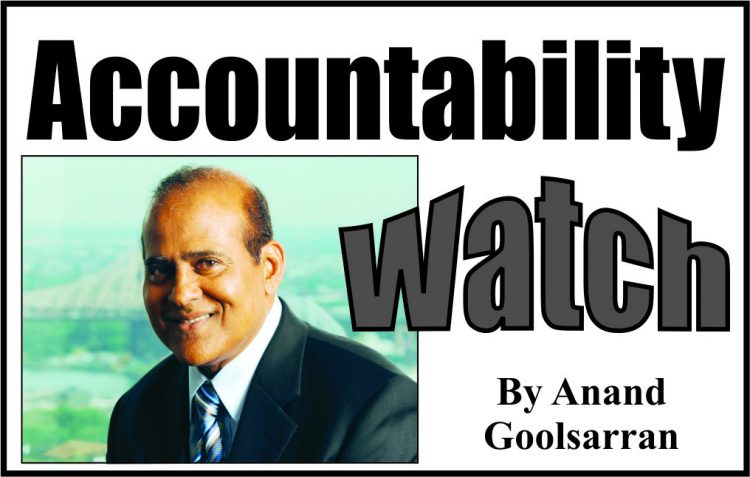 The United States has barred former Ecuador President Rafael Correa and former Vice President Jorge Glas from entry into the United States because of their alleged involvement in corruption. According to the U.S. State Department, the two have abused their positions by accepting bribes, including through political contributions in exchange for granting favourable government contracts. The spouses and children of the former Ecuador officials were also barred from entering the United States.
The United States has barred former Ecuador President Rafael Correa and former Vice President Jorge Glas from entry into the United States because of their alleged involvement in corruption. According to the U.S. State Department, the two have abused their positions by accepting bribes, including through political contributions in exchange for granting favourable government contracts. The spouses and children of the former Ecuador officials were also barred from entering the United States.
In last week’s article, we referred to the President’s insistence that the Government would not interfere with the 2016 Petroleum Sharing Agreement (PSA) with Exxon on the ground that it will destroy the “sanctity of contract” although the PPP/C 2020 election manifesto specifically states that if the party wins the elections, it will renegotiate the Agreement. Article 31.2 of the Agreement allows for the PSA to be amended or modified with the written consent of all the parties to the Agreement. In fact, in April 2019, the Granger Administration successfully negotiated with Exxon an amendment to the PSA to exclude the payment of royalties from being treated as recoverable costs. The relevant section of the Addendum to the Agreement reads as follows: In the interest of the avoidance of all doubt, the parties have come to a mutual and satisfactory agreement that the payment of royalty pursuant to Article 15.6 of the Petroleum Agreement shall be borne solely by the Contractor…The said royalty payment shall not be recoverable cost, in any manner or formulation under the Petroleum Agreement.
One would have thought that the “sanctity of contract” argument would have been made by Exxon and not the Government. The President’s statement therefore raises the important question as to whose interest is being protected, Exxon, or the citizens of this country, considering that Guyana’s natural resources belong to all of its citizens, present and future. The Government therefore has the obligation to ensure that such resources are exploited in a manner that citizens derive the maximum possible benefit therefrom.
ExxonMobil Guyana’s President, Alistair Routledge, has since stated that the U.S. oil giant would not agree to any renegotiation since it would adversely impact on the company’s planned US$55 billion investment in Guyana. He argued that it is better to have a ‘fair share of a larger number’ than a large share of a smaller number. But should this argument not apply also to Exxon? For every 100 barrels of crude extracted, Guyana’s share is a mere 12.5 barrels. This is not to mention, among others:
(a) The measly 2 percent royalty on production which is perhaps the lowest in the history of the oil industry.
(b) The absence of ring-fencing provisions that ensure recoverable costs are not inflated.
(c) Recognition of pre-contract costs totalling US$460 million covering the period 1999 to 2015 as recoverable costs as well as all other costs as incurred in 2016 up to the date of signing of the PSA, estimated at around US$500 million.
(d) Generous fiscal concessions, including the payment of Exxon’s tax liabilities out of the Government’s share of profit oil, leaving little by way revenue accruing to the Government from the profit-sharing arrangement.
(e) The auditing of the recoverable costs which from all appearances has so far been done as a mere formality and for which neither the Government nor Exxon has shown the desired level of interest to ensure transparency and proper accountability.
The International Monetary Fund is on record as having stated that the PSA is overwhelmingly
weighted in favour of the U.S. oil giant. And was it not United States President Joe Biden who had stated in June 2022 that ‘Exxon made more money than God’ because of high gas prices?
Additionally, the allocation of 75 percent of the value of production to meet recoverable costs was calculated at a time when the price of crude oil was about US$50 per barrel, and the break-even point was US$37.50. The price of Brent crude oil is now US$74.64 but the 75 percent deduction to arrive at profit oil remains intact. Considering all of the above, is Guyana getting a fair share, Mr. Routledge? And is it not an unconscionable act to impose on a poor developing country with no experience in oil and gas matters and struggling to protect its borders from Venezuelan aggression, a PSA that denies the country a fair share for the exploitation of its resources?
This columnist was reliably informed that the then Government was misled as to the extent of revenues that would accrue to it in the first year of production, and when questions were raised about the content of the proposed PSA, the U.S. oil giant threatened to walk away from the contract if it was not signed within a particular timeframe. Is there a case for the courts to decide on the validity of the PSA that is a one-sided affair, not grounded in moral and ethical considerations, and foisted upon the citizens of this country through what appears to be an act of coercion?
I have been reading a book titled “Oil Politics: Echoes of ecological wars”, written by Nnimmo Bassey, a Nigerian national. I am truly shocked at what the oil companies, including ExxonMobil, have done in Africa. This is especially so in the Niger Delta which is one of the polluted places on earth caused by the extraction of crude oil as well as the failure of the Nigerian Government to enforce the related laws and regulations to protect the environment. According to media reports, President Irfaan Ali is set to appoint Assistant Police Commissioner, Clifton Hicken, to the position of Commissioner of Police although he has already passed the retirement age of 55 some 14 months ago. According to Earle John, Human Resources Consultant, there is no precedent for someone to be appointed to a position after attaining the retirement age. Retired Assistant Commissioner of Police, Clinton Conway, added his voice in support of Mr. John, stating that that former Commissioners, Balram Raghubir, Laurie Lewis, Floyd Mc Donald, Henry Greene and Leroy Brummel all had their services extended before they reached the age of retirement.
Appointment of acting Commissioner of Police
By Article 211 (2) of the Constitution, if the office of the Commissioner of Police is vacant, the President shall appoint a person to act in the position until such time that the substantive holder resumes position, or a person has been appointed as Commissioner. Once appointed, the person is required to vacate office upon reaching the retirement prescribed by Parliament.
Mr. Clifton Hicken was appointed to act as Commissioner of Police in March 2022 when he was 53 years old. He reached retirement age of 55 in July 2023. In response to a question raised in August 2023 about the future of Mr. Hicken, the President stated that he had already issued a letter extending his acting appointment to a date to be determined. It is unclear under what authority the President did so. The 1967 Constitution (Prescribed Matters) Act permits the retirement age of both the Commissioner of Police and the Auditor General to be extended from age 55 to 60 as agreed upon by the officer holder before he/she reaches 55 years of age. There is no provision in this Act that allows for an acting appointment to be extended beyond the age of 55.
In the case of the Auditor General, the retirement age was increased to 65 prior to 1992 when the late Mr. Farnum was Auditor General. By virtue of the Audit Act 2004, it is now the same as that of the Chief Justice. One recalls the case of the current Auditor General who acted in the position for eight years from 2005 to 2012 before being substantive appointed days before he attained the retirement age of 55 in his substantive position of Deputy Auditor General. He had publicly boasted that he could serve as acting Auditor General until age 65. When we drew attention that this was not possible and that he must demit office, within a day or two, former President Donald Ramotar swore him in as Auditor General! This was notwithstanding that the acting Auditor General’s performance was far from satisfactory, especially as regards the timeliness of his report to the National Assembly as well as its quality and comprehensiveness. For example, for the years 2004 through 2009, reports were issued on average 204 days after the statutory deadline and were almost exclusively a copy and paste of previous reports, using the 2003 Auditor General’s report as the starting point, with appropriate adjustment to reflect transactions for the year under review.
Constitutional provisions on the appointment of Commissioner of Police
Article 211 (1) of the Constitution requires the President to have meaningful consultation with the Leader of the Oppo-sition before appointing the Commission-er of Police. He is also required to consult with the Chairperson of the Police Service Commission after the Chairperson has consulted with other members of the Commission.
Chief Justice ruling on the acting appointment of Mr. Hicken
As indicated above, the President appointed Assistant Commissioner Clifton Hicken to act as Commissioner of Police to replace Nigel Hoppie who proceeded on pre-retirement leave. This prompted the political Opposition APNU+AFC to seek judicial review of the appointment on the grounds that there was neither consultation with the Leader of the Opposition nor the Chairperson of the Police Service Commission.
In her ruling of August 2022, the Chief Justice stated that the President did not breach the Constitution in the choice of Mr. Hicken to act as Commissioner, as he could not have ensured full compliance with the Constitution because of circumstances beyond his control. She noted that at the time there was no elected Leader of the Opposition nor was the Chairperson of the Police Service Commission appointed. In the circumstances, the President had to act to ensure that a Commissioner of Police was in place and that no lacuna existed:
It could not be that the President should have been rendered incapable of discharging his functions to appoint a Commis-sioner of Police. In this sense, there was a necessity to act to ensure that the unexpected lacuna did not result in a situation that would have left the Guyana Police Force without a Commissioner.
The political Opposition had also argued that Deputy Commissioner Paul Williams should have been appointed to act as Police Commissioner. However, the Chief Justice did not address this issue. It nevertheless boggles the mind as to why the political Opposition did not get its act together to appoint the Leader of the Opposition following the resignation of Joseph Harmon in January 2022, considering that the Leader of the Opposition’s input is necessary in relation to the appointment of members of key constitutional bodies.
Conclusion
Mr. Hicken’s tenure as Acting Com-missioner of Police should have ended in July 2023 unless he was substantively appointed before that date in which case it would have been entirely appropriate for the President to extend his appointment to a date not later than age 60. In the circumstances, it would appear that the President was ill-advised when he extended Mr. Hicken’s acting appointment beyond his retirement age. Indeed, the continuation of Mr. Hicken as Acting Commissioner of Police beyond July 2023 lacks legal/constitutional support. Therein lies the problem. Can it now be corrected by way of a substantive appointment without breaching the Constitution?
It has been suggested that Mr. Hicken should proceed on retirement, after which he could be re-employed as Commission-er of Police on a contractual basis. This is a non-starter in that the Constitution prescribes how the Commissioner is appointed and on what basis he/she should demit. These provisions cannot be replaced by a contractual agreement.
Next week, we will be discussing the 2023 Auditor General’s report which was recently laid in the National Assembly and therefore made public. We note from media reports that Ministry of Health has denied the statement by the Auditor General that billions of dollars’ worth of drugs had expired between 2023 and June this year. This as well as other issues raised by the Auditor General will be looked at.









